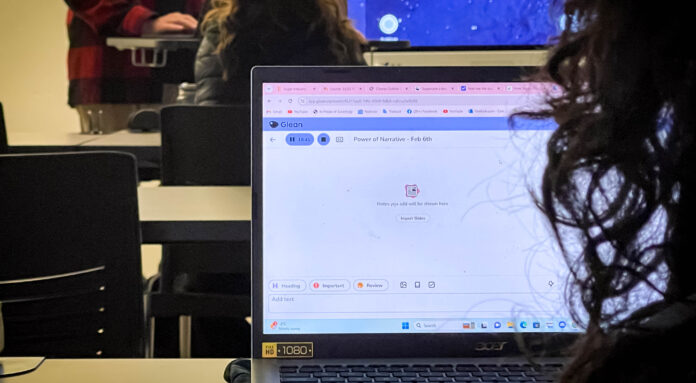St. Thomas University’s English professor Andrew Klein said he is skeptical about Glean in his classroom. On the one hand, the online service takes notes for students with accessibility needs and makes all recordings unsharable so that the content of his lectures is protected. But on the other hand, he isn’t sure how the company itself might use the data it collects.
In a previous article on Glean, The Aquinian asked students what they thought of the Google-owned AI note-taking app replacing student note-takers. However, one question remains: what do professors truly think about Glean? The Aquinian delved into a professor’s concerns regarding AI integration in the classroom.
Related: AI technology Glean replaced student note-takers: how is that going?
Glean functions as a transcription service that records lectures and generates keynotes. Klein’s primary concern is how Glean may use his work, which is held to intellectual property laws, for non-transcription purposes such as training chat-bots adjacent to ChatGPT.
“You get into bed with a large company or corporation that has these kinds of interests that go beyond just the educational,” he said. “They’ll have a database with all of our recorded lectures on it and they might take a portion of those lectures and use them to train AI models.”
Related: Will ChatGPT replace university essay writing?
This is not an unfounded anxiety on Klein’s side, as other AI companies have been trained using data from non-consenting third parties. For instance, Clearview AI was found guilty in 2020 of scraping photos from non-consenting users on Facebook and other social media to train its facial recognition bot.
Glean itself has a FAQs page for faculty, but none of its answers directly say if the company is using data for machine learning. Furthermore, according to Glean, the app stores data in Google Cloud and Amazon Web Services, the latter having a policy to use data for machine learning.
“Glean works with other companies that don’t necessarily have the same mandate or mission that Glean does,” he said.
While Klein sees this issue, he said Glean is just the tip of the iceberg, as other big tech companies like Google and Microsoft have been collecting user data and using it for machine learning for years.
“I’m less worried about my lectures feeding an AI, but I don’t like the lack of clarity,” he said. “There is some insecurity and just not knowing what the future holds for this kind of technology in the educational space.”
Klein also acknowledges that Glean is useful at STU due to difficulties finding note-takers and financial constraints. However, he highlighted that AI does not make the classroom more accessible at the moment.
“There’s lots of potential. The thing is that the surge in the use of AI in the last two years is moving so fast, it’s hard to know exactly how to use it.” said Klein.
With files from Cesar Camacho.

